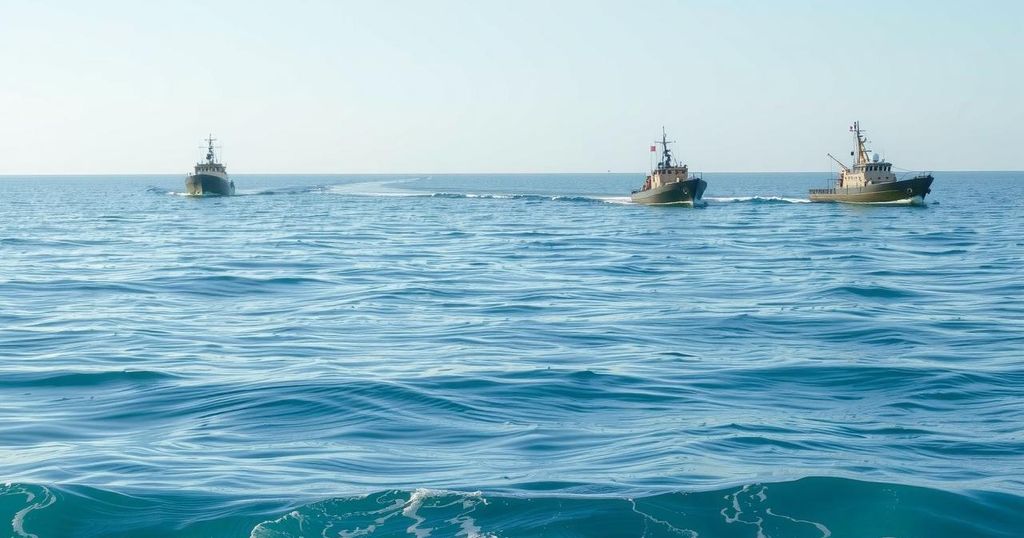The Houthis have resumed their naval blockade on Israeli ships in Yemen’s waterways after a deadline for allowing aid into Gaza expired. This move signals renewed conflict, affecting maritime traffic and escalating tensions in the region. The United States is mobilizing military assets to protect shipping routes, while the Palestinian Islamic Jihad has endorsed the blockade as support for Gaza.
On Tuesday, the military spokesperson for Yemen’s Houthi-led government announced the reestablishment of a naval blockade on Israeli ships, coinciding with the end of a deadline for Israel to permit humanitarian aid into Gaza. Brigadier General Yahya Saree stated during a televised address that this blockade encompasses Yemen’s waterways in the Red Sea, Arabian Sea, Gulf of Aden, and Bab el-Mandeb Strait.
The Houthi leader, Abdulmalik al-Houthi, had previously issued a four-day ultimatum on March 8, demanding that aid be allowed into Gaza during ceasefire negotiations. Israel had reimposed a total blockade on Gaza earlier, significantly exacerbating the humanitarian crisis by restricting the entry of essential supplies, including food, fuel, and medicine, which caused prices to surge. On Sunday, Israel also cut off electricity to Gaza, further worsening water supply issues.
With the ultimatum’s expiration and Israel intensifying its blockade, the Houthis declared their intention to resume hostilities against Israel by targeting Israeli-assumed vessels in strategic maritime routes between Asia and Europe. Saree warned, “Any Israeli ship attempting to break this blockade will be targeted in the declared operational area,” stating that the blockade would persist until humanitarian aid is permitted to enter Gaza.
The Houthis initiated their campaign against perceived Israeli-linked shipping in solidarity with Palestinians in the wake of Israel’s military incursions into Gaza, which began on October 7, 2023. They have conducted multiple drone and missile strikes, resulting in casualties and a significant reduction of merchant shipping traffic, particularly impacting the Israeli port of Eilat and causing economic distress to Egypt via the Suez Canal.
The Houthis’ actions prompted retaliatory strikes from the US, UK, and Israel, though these measures had little effect on deterring the group. Reports indicate that Israeli forces remain in a heightened state of alert for further missile strikes originating from Yemen.
In response to the crisis, the United States has sought to unite regional allies against Houthi aggression affecting shipping lanes in Yemen’s waters. On Monday, Secretary of State Marco Rubio conferred with Saudi Crown Prince Mohammed bin Salman, addressing various issues, including threats from Houthi activities that undermine global trade and risk US interests and Saudi infrastructure.
Military assets from the United States have been positioned in Yemen’s Red Sea to ensure the safety of cargo vessels navigating these waters. The Palestinian Islamic Jihad welcomed Yemen’s blockade as a vital pressure tactic against Israel, endorsing the Houthis’ actions as reflective of Yemeni support for Gaza. Their statement emphasized, “We express our appreciation for this significant support and call on the Arab and Islamic nations to take similar stances that strengthen the resilience of our people.”
The renewal of the naval blockade by Yemen’s Houthis on Israeli ships symbolizes a determined stance in response to humanitarian crises in Gaza. This escalation reveals both regional tensions and international ramifications, as it affects vital shipping routes and triggers retaliatory military responses from other nations. The ongoing conflict underscores the need for greater international awareness and intervention to facilitate humanitarian aid and restore stability in the region.
Original Source: www.dropsitenews.com




